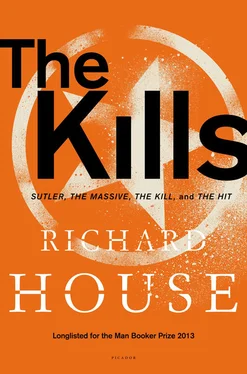Berens rises, and comes slowly forward. He looks to Rike, the cot, the water. Steps into the corridor and then closes the door.
Hands up Rike traces the sides of the door searching for a handle and finds nothing. The darkness is absolute, unbroken. There’s no sound other than her breathing, her heartbeat, the pressure increasing in her ears.
She beats at the door, shouts, struggles for breath and sits down, dizzy.
* * *
She wakes to find Tomas over her, and immediately recoils. The light is unbearably bright. He has brought ice, he says. This will help. She has been sweating, her hair is matted to her forehead, her clothes twisted so that she can’t move comfortably. As she rolls from her stomach to her back her head throbs, her tongue feels thick in her mouth. She can’t quite make sense of what he’s saying.
There are things which make no sense to her, memories from a long time back. A woman changing out of her bathing costume on a beach, and the way she holds the string of the costume aside with a little disbelief. This is what? Punta Sabbione, nineteen-what? Another, more specific, climbing worn steps to a belfry. It’s Köln cathedral, and the wall opens suddenly to a view of the square. The market below, the slabbed court. Her father had reached out to secure her, but held his hand flat, as if to push. A shocking thing, to stand so close to an edge, to have your father’s hand thrust forward, as if to shove. And did she properly trust him after that?
Tomas beside her: Rike shielding her eyes, trying nevertheless to calculate the distance between Tomas and the door. Her legs are so heavy there’s no point making the attempt. She tells herself not to sleep. Next time. However long, she needs to be ready.
The door makes a suck as it closes and in a matter of minutes the heat overwhelms her.
* * *
When she wakes she reaches out, finds the metal bowl, and the ice melted but the water still cold, which could be three hours, perhaps. She can’t judge. Holds her wrist to her face to see if she can tell the time. The darkness is so complete, so thorough her arm could be a kilometre from her face, or centimetres. As long as she is lying on the cot she has an instrument to place herself in the space.
Her body reacts badly to the heat, she feels sick, her head aches. She attempts to rationalize these sensations, and fights against a rising squabble of panic and fear.
The room has been prepared. A bed. Water. But no commode. She can’t judge if this is deliberate or opportunistic. Would he have brought her here if she hadn’t come? Does he intend this to be short, as in hours, or long, as in days? Is this some kind of punishment?
When he returns she will tell him that she is diabetic. That there are certain requirements, problems, details he hasn’t accounted for. She will not ask why this is happening.
12.2
It’s a whole different thing being inside the house after observing it from outside, from the shell of the hotel. For one thing it’s smaller, and what seemed to be clean and ordered is actually battered. This is rented accommodation, other people have lived here, and they remain in some way, through scuffs on the walls and scratches on the floor. There is a history of use.
He’s not keen on how everything is placed. The sofa faces the garden, cuts the room in half. It’s uncaring in the way things don’t fit. It isn’t lived in. It isn’t accommodating either for Tomas — chairs block the exits.
Neither is it personable. Two photographs mounted in the same frame are the only personal element. Relatives, he supposes, people from another century who have a vague wash of history, a little startled awe in their slightly open mouths, their black eyes.
Isa is still in hospital.
Tomas collects towels from the house. Two tea towels, a striped beach towel, a small blanket with an Air France logo. He places these aside with a roll of duct tape. Under the kitchen sink he finds a black bin bag and two clear plastic shopping bags.
* * *
When Henning returns he makes no attempt to sound an alarm. He sits where he is told, and hands Tomas his phone without comment. Tomas explains that Henning shouldn’t waste time thinking over what he needs to do.
‘Rike is safe. I need information about the man in hospital. Do you know who he is?’
Henning remains composed, dignified.
‘I want to know who he is. Is he Sutler?’
‘No.’
‘You’re certain.’
‘I’m certain.’
Tomas nods in agreement.
‘Who is he?’
‘We don’t know.’
Tomas leans forward with his elbows on his knees. ‘Who do you think he is?’
Henning shakes his head. ‘I don’t know who he is.’
‘How certain are you he isn’t Sutler?’
‘Absolutely certain. He’s Caucasian, between forty-five and fifty. He might be too old to be Sutler. He has had a procedure on his upper inner arm to remove a tattoo. There is no mention of Sutler having a tattoo. Within the past month he has had replacement fillings in his front teeth and a front crown, this would have happened while Sutler was already in Iraq.’ Henning’s voice thins and dries. He pauses to wet his lips, looks to the window. Calculating. ‘We’re almost certain that he has lived in Europe. He meets the profile of most contractors. There is trafficking along the Syrian border. It is possible he is involved, which would explain why no one has come forward. Why are you here? Where is Rike?’
Tomas ignores the questions. He can see Henning thinking, can trace the calculations. Henning understands the economy of their discussion: the values, the costs, exactly what is at stake.
‘What do you need to release her?’
Tomas again refuses to answer.
‘Why are you interested in Stephen Sutler?’
Tomas allows a small pause. ‘What did you discuss with Parson when you met him in Istanbul?’
‘It doesn’t matter.’
‘What did you talk about?’
‘It’s pointless now. It’s redundant. It doesn’t matter.’ Henning closes his eyes and runs a hand hard across his forehead. ‘The man we have in hospital won’t live. He has an infection we can’t control, and respiratory problems. He isn’t responding to the drugs. It no longer matters who he is. None of this matters any more.’
‘What did you discuss?’
‘I told him that Sutler was a fiction. It was my belief that HOSCO invented Sutler, they either invented him, or they used someone. Sutler is a scapegoat.’ Henning clears his throat. ‘None of this matters. Paul Geezler, the man who reorganized HOSCO in the Middle East, is missing. No one has any idea where he is. He was in New Mexico. He is missing. No one has heard from him. Whatever this was about, it’s over. Sutler is gone. Geezler is gone. Parson is dead. The company is now refigured as something else. It’s all redundant. Whatever point this had — it doesn’t matter any more.’
Tomas takes the African staff from the coffee table and strikes Henning with a horizontal swipe. The force runs through his wrist, so that the staff rebounds, almost bounces free from his grip. The first blow is intentionally savage. There is no backward step, no going back. After the first blow Tomas is committed. He swoops the staff overhand and draws it down, this time on Henning, knocked to the floor, hands either side, not in defence, but ready to push himself upright.
* * *
Tomas washes his hands at the sink. Douses water over the back of his neck. Does not look at the mess in the room behind him. The pathway from the bed to the hall. His knuckles are cut, he has no idea how this has happened, and does not want to clean the staff nor the room but understands this to be necessary.
Читать дальше












